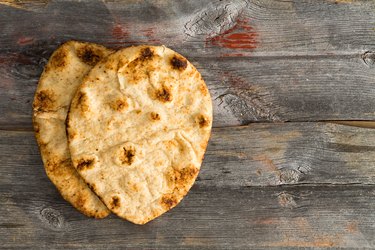
Naan's nutrition facts depend on whether the bread is made with whole grain flour or white flour: They comes in both varieties. Whole grains are rich in fiber and minerals, while white flour contains no fiber and few nutrients.
Naan Bread Nutrition
Video of the Day
Naan is a traditional flatbread originating in West, Central and Southeast Asia, says Michigan State University. Although it's usually made of whole wheat flour, it can also be made with white all-purpose flour. Available in the U.S. in many flavors, naan bread uses an uncommon ingredient for breads — yogurt. Typically, the bread is shaped round, like a tortilla, and cooked in a skillet.
Video of the Day
The United States Department of Agriculture provides naan nutrition info for brands made with whole wheat. A 106-gram piece contains 303 calories, 10.81 grams of protein, 7.10 grams total fat, 48.98 grams of carbohydrates, 5.10 grams of fiber, 3.60 grams of sugar and 495 milligrams of sodium.
The sodium, sugar and calories in naan bread are greater than the amount in some other breads. If you like the flavor, check the ingredients on the label to see if it's made with whole wheat.
Since most naan breads contain fiber from whole wheat, they are a healthier grain choice than white rice, which is devoid of fiber. However, brown rice is a healthier grain choice than naan because it's fiber rich and contains less salt and fewer calories.
Naan Vs. Chapati
Chapati is an unleavened bread made from whole wheat flour, states the Auguste Escoffier School of Culinary Arts. A basic recipe involves four ingredients: flour, warm water, oil and salt, notes the Illinois College of Agricultural, Consumer and Environmental Sciences. Rather than being baked in an oven, it's cooked on a griddle.
A USDA report on a chapati bread shows that a 60-gram piece contains 175 calories, 4.00 grams of protein, 5.00 grams total fat, 27 grams of carbohydrates, 5.00 grams of fiber, 3 grams of sugar and 134 milligrams of sodium. In the product's ingredients section, the first item listed is whole wheat flour. However, it also contains partially hydrogenated vegetable shortening, which is a source of trans fat.
Like naan bread, chapati contains more calories, sugar and sodium than some other bread varieties. Because it's consistently made with whole wheat, chapati would be healthier than the naan bread varieties that are made with white flour.
Choose a Healthy Bread
Whether you like to try breads like naan and chapati or prefer white or wheat, the University of California, Santa Barbara, provides guidelines on how to make a healthy choice. To gauge the wholesomeness of a bread, look at the ingredients listed on the back label.
Since product ingredients are listed in descending order based on quantity, pay the most attention to the one listed first. For maximum nutrients and fiber, it should be whole wheat flour, or another whole grain flour.
If the first ingredient is white flour, enriched white flour, semolina flour, unbleached wheat flour or durum flour, the bread is made of refined grains and not whole grains. The word "whole" should precede the type of flour; otherwise, it's made of unhealthy, rather than healthy, carbohydrates.
Also, take note of the amount of sugar. Choose a bread that is lower is sugar, but avoid brands that are labeled "sugar-free," as they contain artificial sweeteners, which have been linked to negative health effects.
- Michigan State University: "Naan"
- United States Department of Agriculture: "Whole Wheat Naan Bread"
- Auguste Escoffier School of Culinary Arts: "Guide to Indian Breads"
- Illinois College of Agricultural, Consumer and Environmental Sciences: "Chapatis Flatbread"
- United States Department of Agriculture: "Whole Wheat Chapati"
- United States Department of Agriculture: Whole Wheat Chapati Bread"